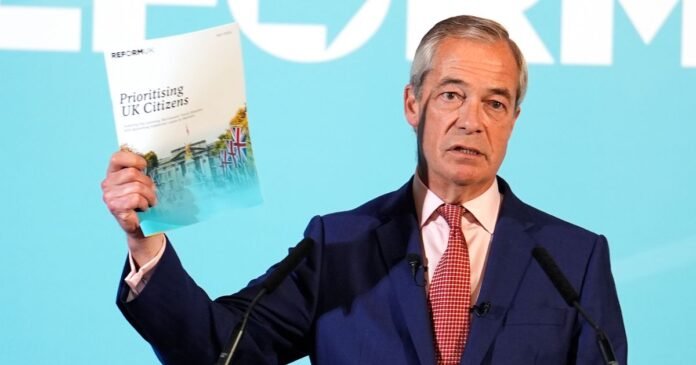Nigel Farage has revealed intentions to tighten regulations concerning migrants’ privileges and to impose stricter conditions on accessing welfare benefits.
The head of Reform UK unveiled his proposal to eliminate the option of indefinite leave to remain if his party, currently comprising 5 MPs, secures power.
Farage emphasized that hundreds of thousands of migrants who arrived in the UK under the more lenient post-Brexit regulations introduced by Boris Johnson’s Conservative government – dubbed the “Boriswave” by Reform – will become eligible for permanent residency starting in January.
Reform UK estimates that from 2026 to 2030, approximately 800,000 new migrants will be granted indefinite leave to remain. However, critics quickly dismissed the plan as lacking a realistic foundation, with doubts raised just hours after its announcement.
Indefinite leave to remain serves as a primary pathway to citizenship, requiring migrants to have lived and worked in the UK for a minimum of five years.
This status grants migrants the freedom to work, reside, and study in the UK indefinitely, with the opportunity to apply for citizenship later. It also provides access to certain benefits, subject to eligibility.
Reform UK aims to eliminate this status entirely, proposing a shift to renewable visas lasting five years. The new visas will have higher salary requirements, stricter English language proficiency criteria, and a ban on benefit claims for eligible individuals.
Mr. Farage assured that there would be no retroactive changes to UK citizenship status, emphasizing that once granted, citizenship remains unchanged.
Farage asserted that the plan to scrap indefinite leave to remain and the entitlement to benefits for migrants would result in savings exceeding £230 billion for UK taxpayers, as stated in a report from the Centre of Policy Studies.
Despite doubts surrounding the figures, Farage reaffirmed the projected savings during a press conference without furnishing evidence to support the claim.
Reform UK’s policy chief mentioned that the salary threshold for the proposed new visas would significantly differ from the current requirements. However, specific details on the salary cap were deferred to closer to the upcoming general election.
Uncertainties persist regarding the impact on essential services like the NHS and the care sector, heavily reliant on migrant workers. Mr. Yusuf mentioned that care workers would fall under a specialized visa category for acute skills shortages.
He emphasized that this visa category would have a finite cap to prevent abuse and that employers benefiting from it would need to fund programs to train British workers. Details regarding the cap and employer costs were not specified.

